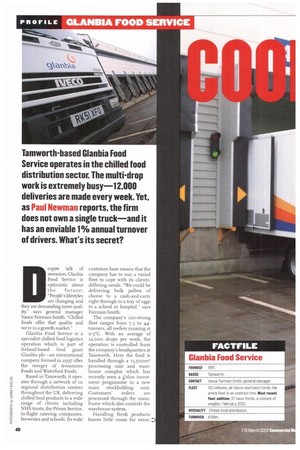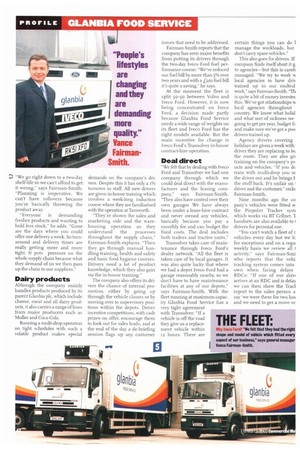Tamworth-based Glanbia Food Service operates in the chilled food distribution
Page 40

Page 42

If you've noticed an error in this article please click here to report it so we can fix it.
sector. The multi-drop work is extremely busy-12,000 deliveries are made every week. Yet, as Paul Newman reports, the firm does not own a single truck—and it has an enviable 1% annual turnover of drivers. What's its secret?
espite talk of recession, Glanbia Food Service is optimistic about the future: "People's lifestyles are changing and they are demanding more quality," says general manager Vance Fairman-Smith. "Chilled foods offer that quality and we're in a growth market."
Glanbia Food Service is a specialist chilled food logistics operation which is part of Ireland-based food giant Glanbia plc—an international company formed in 1997 after the merger of Avonmore Foods and Waterford Foods.
Based in Tamworth, it operates through a network of to regional distribution centres throughout the UK, delivering chilled food products to a wide range of clients induding NHS trusts, the Prison Service, in-flight catering companies, breweries and schools. Its wide customer base means that the company has to run a varied fleet to cope with its clients' differing needs. "We could be delivering bulk pallets of cheese to a cash-and-carry right through to a tray of eggs to a school or hospital," says Fairman-Smith.
The company's tarp-strong fleet ranges from 7.5 to 44tonners, all reefers running at o-5°C. With an average of 12.,000 drops per week, the operation is controlled from the company's headquarters at Tamworth. Here the food is handled through a 13,5oom2 processing unit and warehouse complex which has recently seen a fiGni invest ment programme in a new main stockholding unit.
Customers' orders are processed through the mainframe which also controls the warehouse system.
Handling fresh products leaves little room for error: P "We go right down to a two-day shelf-life so we can't afford to get it wrong," says Fairman-Smith. "Planning is imperative. We can't have rollovers because you're basically throwing the product away.
"Everyone is demanding fresher products and wanting to hold less stock," he adds. "Gone are the days where you could offer one delivery a week. So turnaround and delivery times are really getting more and more tight. It puts pressure on the whole supply chain because what they demand of us we then pass up the chain to our suppliers."
Dairy products
Although the company mainly handles products produced by its parent Glanbia plc, which include cheese, meat and all dairy products, it also carries a range oflines from major producers such as Muller and Coca-Cola.
Running a multi-drop operation on tight schedules with such a volatile product makes special demands on the company's drivers. Despite this it has only a t% turnover in staff. All new drivers are given in-house training which involves a week-long induction course where they are familiarised with the operation at Tamworth.
"They're shown the sales and marketing side and the warehousing operation so they understand the processes throughout the supply chain," Fairman-Smith explains. "Then they go through manual handling training, health and safety and basic food hygiene courses. Drivers need a lot of product knowledge, which they also gain via the in-house training."
The company also offers its drivers the chance of internal promotion, either by going up through the vehicle classes or by moving over to supervisory positions within the depots. Driver incentive competitions, with cash prizes on offer, encourage them to look out for sales leads, and at the end of the day a de-briefing session flags up any customer issues that need to be addressed.
Fairman-Smith reports that the company has seen major benefits from putting its drivers through the two-day lveco Ford fuel performance course: "We've reduced our fuel bill by more than 5% over two years and with a fain fuel bill it's quite a saving," he says.
At the moment the fleet is split 50-50 between Volvo and Iveco Ford. However, it is now being concentrated on Iveco Ford, a decision made partly because Glanbia Food Service needs a wide range of weights on its fleet and Iveco Ford has the right models available. But the main incentive for change is Iveco Ford's Transolver in-house contract-hire operation.
Deal direct
"We felt that by dealing with Iveco Ford and Transolver we had one company through which we could deal direct with the manufacturer and the leasing company," says Fairman-Smith. "They also have control over their own garages We have always been under a lease-hire contract and never owned any vehicles, basically because you pay a monthly fee and can budget the fixed costs. The deal includes both trailers and tractive units."
Transolver takes care of maintenance through Iveco Ford's dealer network. "All the fleet is taken care of by local garages. It was also quite lucky that where we had a depot Iveco Ford had a garage reasonably nearby, so we don't have to have maintenance facilities at any of our depots," says Fairman-Smith. With the fleet running at maximum capacity Glanbia Food Service has a very tight agreement with Transolver: "If a vehicle is off the road they give us a replacement vehicle within 12 hours. There are
certain things you can do 1 manage the workloads, but don't carry spare vehicles."
This also goes for drivers. If company finds itself short it g to agencies—but this is carefi managed: "We try to work IA local agencies to have driv trained up in our multi-d: work," says Fairman-Smith. "Th is quite a bit of money investec this. We've got relationships IA local agencies throughout country. We know what holid and what sort of sickness we going to get per year, budget fc and make sure we've got a poo drivers trained up.
Agency drivers covering holidays are given a week with driver they are replacing to Ie the route. They are also git training on the company's pr, ucts and vehicles. "If you dc train with multi-drop you se the driver out and he brings I-. the stuff back. It's unfair on driver and the customer," reek( Fairman-Smith.
Nine months ago the co pany's vehicles were fitted w the Pinpoint Tracker systt which works via BT Cellnet. 1 handsets are also available to drivers for personal use.
"You can't watch a fleet of vehicles every day but we lc for exceptions and on a regu weekly basis we review all I activity,says Fairman-Smi who reports that the vehi tracking system comes into own when facing delays RDCs: "If one of our driv4 arrives at an RDC and is delay we can then show the Traci report to the sales person a say 'we were there for two hot and we need to get a move or
























































































































































